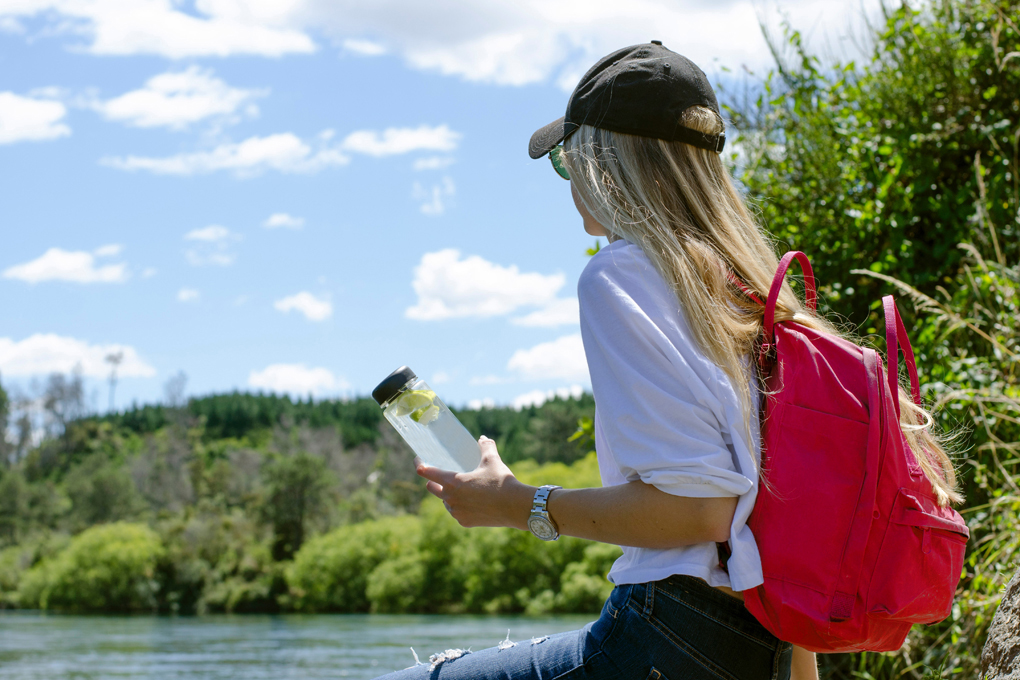Expect some expenses
Going green isn't free. You'll need reusable, durable containers. Remember, reusing your containers will help you recover their initial cost. Bulk household goods (dish soap, detergent, etc.) are good examples. Just go back to the store, refill your containers and pay when you leave.
The same goes for containers to store food in the fridge. Instead of buying small bags or plastic containers, choose glass or silicone ones. They cost more at first, but last longer.
Zero-waste living may affect your pocketbook, but there are ways to save money while protecting the environment.
Rethink your daily routine
The festival season is upon us, and festivals mean water bottles. If there's a time of year when your reusable water bottle can save you big time, it's now.
Your reusable water bottle will also come in handy in your day-to-day life. It will you save a lot of toonies and reduce your environmental footprint. This wise decision will be well worth since you'll save money— a nice perk when it comes to buying food in bulk!
Plan for the cost of responsible eating
Let's be honest: when it comes to food, sometimes it's more expensive to buy in bulk. A zero-waste lifestyle goes beyond cutting waste. It also means thinking about where the products we buy and eat come from. Most products on bulk grocery shelves are from local, organic, fair-trade farmers.
Price differences can be a challenge, but buying local, ethical, organic food is good for your health and the local economy. This is also part of the zero-waste ideology.
Does it cost more in the long run? Some products are more expensive than in regular grocery stores and others aren't. It all depends on your eating habits. Cost differences end up being minimal or at least manageable.
To make up the difference, you just have to organize your finances and buy only what you really need. A budget calculator can give you a realistic picture of how much money you actually have and what you spend it on.
Don't overconsume
You probably realize by now that consuming responsibly is the opposite of buying impulsively, which is good because it prevents overconsumption.
This also applies to clothes. We often forget that buying second-hand clothing is a step toward zero waste. Why not shop for a cheap, unique thrift-store piece instead of heading for the department store? The same goes for furniture, luggage and all kinds of other items you might not consider when you think about a zero-waste lifestyle.
Plan your time and what you want to do
A lack of time sometimes gets in the way of environmental awareness. Transitioning to zero waste won't just affect your finances, it will also change your entire lifestyle.
To spice up your meals and save on fruit and vegetables, why not start a home garden? Gardening is a great way to save while still living waste free. Space may an issue if you live in the city, but many neighbourhoods have community gardens that could meet your needs. It takes time at first but after the land is cleared, the soil is turned, and the seeds planted, you'll be delighted with your crops!
If you're short on space, an herb garden is a good solution. No more buying fresh herbs wrapped in plastic; just serve yourself from your balcony. To save more space on your balcony, you could even grow your plants in glass jars along your window sills or in flower pots on a shelf.
You can also make your own cosmetics. From soaps to scrubs to moisturizing creams, you can find multiple recipes and videos online that show you how.
Once you've got the recipe down pat, why not offer your cosmetics to those around you during the holiday season and save money on gifts? To start making your own cosmetics, you'll need to set aside some time and money to buy equipment and ingredients. It's a lot like gardening: after the initial effort (and expense!), it eventually pays off.
Take it one step at a time
You don't need to overhaul your whole routine overnight. Such a drastic change would scare off anyone. Take things one step at a time. Gradually, your actions will become habits and you'll build a different mindset, which will lead to new buying reflexes. Recycling and composting are great examples of individual steps that are easy to incorporate into your daily routine. Always remember—and it can't be said enough—every little step counts..
Get ready
Going zero waste requires some up-front expenses. You may want to buy reusable containers, gardening equipment and ingredients to make your own cosmetics and household products. Ethical, responsible eating also costs more. Many of these expenses will pay for themselves as you reuse what you buy. When you add on everything you'll save thrifting and when you're out and about, your personal finances are sure to be in good shape.
It's true that going zero waste takes some organization, time and money, but the benefits outweigh the small price difference.
When you're ready to shift to responsible consumption and want to be well prepared, check out our financial tools to ease the transition and make your experience a positive one.
